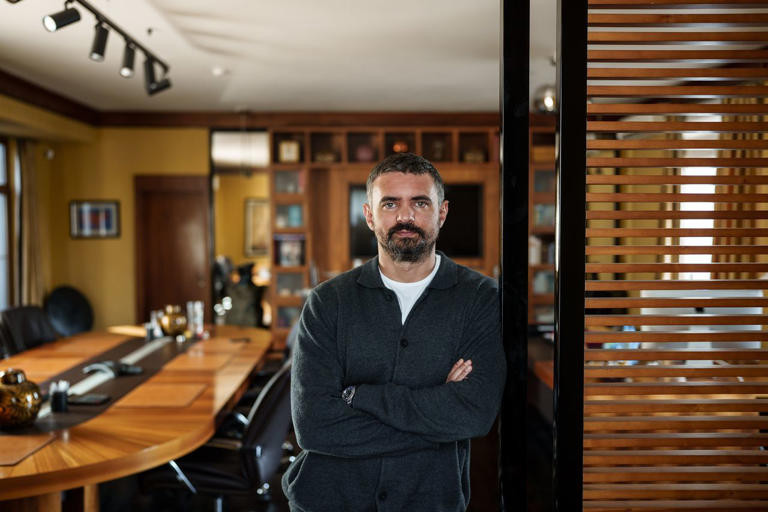Ukraine’s struggle to maintain its businesses amidst the ongoing conflict with Russia is evident in the challenges faced by entrepreneurs like Liski. Despite the country’s need for essential infrastructure like a functioning window-glass factory, securing project finance remains a significant obstacle.
Liski’s endeavor to build a glass plant near Kyiv highlights the difficulties in accessing funding, with banks showing reluctance to lend amid the uncertainties of war. While Liski is prepared to invest a substantial amount into the project, the remaining financing required poses a considerable challenge.
This dilemma reflects a broader issue across Ukraine, where businesses are grappling not only with the physical impact of the conflict but also with the economic strains it brings. As the nation continues to confront Russian aggression, maintaining and sustaining its economic activities become critical components of its fight for national survival.
The financial assistance provided by the EU and other institutions helps bridge the funding gap, albeit partially, enabling Ukraine to continue functioning amid the challenges of war. With armed combat being financially draining and the wartime economy fraught with risks, sustaining economic activities becomes essential for both immediate survival and long-term resilience.
Former U.S. special representative on Ukraine, Kurt Volker, emphasizes the strategic importance of ensuring Ukraine’s economy remains robust compared to Russia’s. This not only involves prevailing on the battlefield but also ensuring the functionality of factories, cities, and farms.
Despite the significant challenges posed by Russian attacks on housing and infrastructure, particularly in the energy sector, Ukrainian companies like DTEK have demonstrated resilience by investing substantial resources in rebuilding efforts. Looking ahead, there’s a shift towards expanding into green energy, reflecting Ukraine’s determination to not only recover but also adapt and innovate amidst adversity.
The challenges facing Ukraine’s economy are multifaceted, with access to capital emerging as a particularly daunting obstacle. While companies like DTEK demonstrate resilience in navigating logistical and security risks during wartime, securing adequate funding remains a significant barrier.
Economists estimate that Ukraine requires substantial financial support, both for military aid and reconstruction efforts, with annual needs amounting to billions of dollars. However, the war’s impact on Ukraine’s economy exacerbates existing weaknesses, including inefficiency, infrastructure deficits, and corruption.
The conflict has ravaged key sectors, transforming productive assets into battlegrounds and disrupting supply chains. The destruction of farmland, ports, factories, and mines further hampers economic recovery and exacerbates investor reluctance to commit funds to enterprises operating in uncertain and volatile environments.
For businesses like Carpathian Mineral Waters, expansion plans are hindered by limited access to financing from domestic banks, which offer loans at prohibitively high interest rates and demand substantial collateral. Despite understanding banks’ caution, entrepreneurs face a daunting burden in securing capital for growth and development initiatives.
“You take all the risk personally,” he said.
Securing capital remains a formidable challenge for entrepreneurs like Ustenko, who are exploring alternative avenues such as grants and loans from Western international financial institutions. While these funds may not amount to millions, even smaller sums can have a significant impact on business operations. Moreover, obtaining such support is viewed as a validation of a company’s credibility and potential.
Recognizing the need to bolster small businesses, the Ukrainian government is establishing a $1 billion recovery fund with assistance from financial giants like BlackRock and JPMorgan Chase. This initiative aims to stimulate private investment by providing a catalyst for economic revitalization.
However, identifying viable projects that align with international investor criteria presents a hurdle, particularly among small enterprises. Shurma highlights the scarcity of “bankable” projects, underscoring the need for concerted efforts to bridge the gap between Ukrainian entrepreneurs and global investors.
Despite the risks associated with energy infrastructure as a prime target for Russian attacks, international funding is being directed toward renewable energy projects, driven in part by efforts to reduce dependence on imported fossil fuels. Nonetheless, security concerns persist, as evidenced by recent drone strikes targeting wind farms in southern Ukraine.
DTEK’s emphasis on distributed power generation through wind farms and rooftop solar arrays underscores the resilience of such infrastructure in the face of Russian attacks. Unlike traditional centralized thermal power plants, wind and solar facilities are less susceptible to complete shutdown from a single missile strike, mitigating the impact of potential attacks on Ukraine’s energy infrastructure.
The successful operation of DTEK’s wind farm near the frontlines exemplifies this resilience, providing power to hundreds of homes despite the ongoing conflict. Plans for further expansion reflect the commitment to renewable energy development despite challenges posed by the war.
The situation in Ukraine, characterized by a lack of capital and the need for economic self-sufficiency, draws parallels to post-World War II Europe. Just as European nations overcame wartime animosities to form economic partnerships, Ukraine seeks to bolster its resilience through military protection and alliances. The aspiration to join NATO, though a long-term endeavor, reflects Ukraine’s pursuit of security and stability in the face of external threats.
In this context, Ukrainian entrepreneurs play a crucial role in driving economic growth and resilience, embodying a sense of patriotism through their contributions to job creation and national development. Their resilience and determination are vital components of Ukraine’s efforts to achieve self-sufficiency and withstand the challenges posed by conflict and instability.






